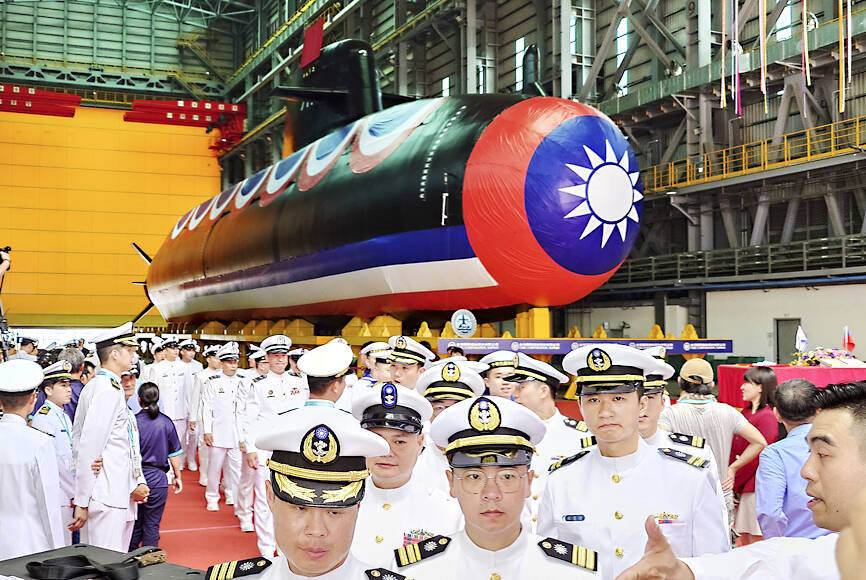Taiwan’s first indigenous defense submarine prototype, the Hai Kun (海鯤, SS-711), is undergoing a harbor acceptance test, a navy official said yesterday.
Admiral Huang Shu-kuang (黃曙光), who heads the Indigenous Defense Submarine program, said that personnel are training on the Hai Kun’s systems and equipment, and the next step would be a sea acceptance test (SAT) in the second quarter of next year.
The submarine was initially launched on Sept. 28, after seven years in development, he said, adding that the program has been supervised and audited by the Legislative Yuan, the Control Yuan and other government agencies, and no problems have been found.

Navy personnel gather at the launch of the nation’s first domestically made submarine, the Hai Kun, at CSBC Corp, Taiwan’s shipyard in Kaohsiung on Sept. 28.
Photo: Chiang Ying-ying, AP
Before the SAT, officials would thoroughly test all of the Hai Kun’s equipment and systems to ensure it operates within specifications, he said.
Rumors that the SAT would be conducted in the first quarter owing to progress on the harbor acceptance test were untrue, a source speaking on condition of anonymity said, adding that the tests would proceed according to the original schedule.
The Hai Kun has already passed inspections of its welds and watertight components, the source said.
The submarine’s development has become an election issue, with opposition candidates saying they would investigate people involved in the program over allegations they leaked information to China.
Huang has concerns about the program, and during a recent interview with the Nikkei newspaper, he said the program has received affirmation from US defense analyst H.I. Sutton, as well as Kazuki Yano, a former submarine fleet commander in the Japan Maritime Self-Defense Force.
Commenting on the Hai Kun’s NT$49.3 billion (US$1.58 billion) price tag, Huang said that the need to cooperate with international contractors for some components that Taiwan does not make contributed to the submarine’s cost.
In terms of domestic expenses, the cost included the construction of five workshops that made parts for the vessel, the purchase of automatic plate rolling machines, automatic welding machines, pipe bending machines and precision drilling machines, as well as two storage facilities for spare components, he said.
The amount also included labor, domestic and foreign materiel, and consultation fees for shipyard construction and naval technical assistance.
Citing an example of foreign procurements for the submarine, Huang said the US supplied 18 MK-48 torpedoes and spare parts.
Foreign procurements accounted for 60 percent of the submarine’s total costs, he said.
“The program was carried out in accordance with the laws, and was subjected to five special reports and on-site inspections by the Legislative Yuan,” he said. “The Control Yuan also conducted three special reports, and the National Audit Office conducted three financial audits.”
Source: Taipei Times - 2023/12/18




















